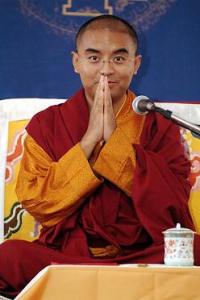 One of my spiritual teachers - Yongey Mingyur Rinpoche - recently disappeared. On purpose.
One of my spiritual teachers - Yongey Mingyur Rinpoche - recently disappeared. On purpose.
He was just entering into a three-year retreat. Then, one day he vanished from his room leaving only a letter behind. He left without money, credit cards, extra clothing, or smartphone. No one knows where he is.
Rather than practicing in closed retreat in one location, as most dedicated retreaters do nowadays, he's adopted the approach of a wandering yogi. He says:
"As demonstrated by the great yogi Milarepa, there is also a tradition of wandering from place to place, staying in remote caves and sacred sites with no plans or fixed agenda, just an unswerving commitment to the path of awakening. This is the type of retreat that I will be practicing over the coming years."
Not only is Mingyur Rinpoche an extraordinary spiritual teacher with a dedicated community of followers, he's a New York Times best-selling author.
And he was one of the long-term meditators invited to the Waisman Laboratory for Brain Imaging and Behavior at the University of Wisconsin in 2002, where Richard Davidson, Antoine Lutz, and other scientists examined the effects of meditation on the brains of advanced meditators.
In other words, he had all the trappings of ordinary success.
So why would a successful person drop their normal life and activities to pursue spiritual awakening in such a radical way?
I find this a powerful question for reflection so I offer it here. It's a question that might be of value whatever your spiritual orientation.
After all, contemplation in solitude is not the exclusive domain of Buddhism. Contemplative practices are at the heart of all major religious and spiritual traditions. St. Teresa of Avila, Thomas Merton, Hindu yogis, Emerson, and Thoreau are a few contemplatives that come to my mind.
This might even be a provocative question if you are thoroughly embedded in the material world.
Are You Making Space in Your Life for Your True Nature?
I feel deeply moved by Yongey Mingyur Rinpoche's courage, commitment, and clarity of vision. Moved to tears at times. Yet I feel more connected to him than ever.
But, more important than my emotional reaction, is the way his decision is influencing me to realign my own priorities. While it's common these days to complain about digital fatigue - for good reason - here's someone who's left it all behind. That's got me thinking.
In his parting letter, Rinpoche prompts us to consider if we are making adequate space in our life to nourish our basic nature:
"All that we are looking for in life — all the happiness, contentment, and peace of mind — is right here in the present moment. Our very own awareness is itself fundamentally pure and good. The only problem is that we get so caught up in the ups and downs of life that we don't take the time to pause and notice what we already have.
Don't forget to make space in your life to recognize the richness of your basic nature, to see the purity of your being and let its innate qualities of love, compassion, and wisdom naturally emerge. Nurture this recognition as you would a small seedling. Allow it to grow and flourish."
I've recently been reflecting on this question:
Do I want to live in the world of concepts or do I want to live in the world of direct experience?
Most of us live in the world of concepts. We seldom experience the world directly. Perception rapidly sparks conceptual thought which, more often than not, triggers afflictive emotions. These easily evolve into hardened preferences and rigid values that define our world.
So we end up living in a fabricated world of concepts and emotions instead of experiencing the gift of life directly. This only brings suffering and takes us further and further away from any sense of genuine happiness and contentment.
To live in the world of direct experience requires dedicated training of the mind. It takes time. And that means making choices.
Meditation and contemplation - including the skillful use of the conceptual mind - are two ways to intercede and unwrap the spiral of confusion and gradually return to the natural state of mind. Being in natural mind is living in the world of direct experience free of fabrication and labels. Of course, we also need to bring the clarity of mind we gain in meditation into daily life.
You may never be ready to enter into a three-year retreat like Mingyur Rinpoche. That's not the point.
The real question is what can you do? Can you carve out ten minutes of solitude each day? Thirty minutes or an hour? Whatever amount of time you dedicate to inner nourishment will move you in a positive direction toward living in the world of experience.
Do you find it challenging to make space to nourish your true self? How do you make the the time?
Yongey Mingyur Rinpoche's book The Joy of Living: Unlocking the Secret and Science of Happiness is one of the best introductions to meditation and the nature of mind available today. I recommend it highly.
Thank you for your presence, I know your time is precious! Don’t forget to sign up for my e-letter and get access to all the free self-development resources (e-books, mini-guides + worksheets) in the Always Well Within Library. May you be happy, well, and safe – always. With love, Sandra
